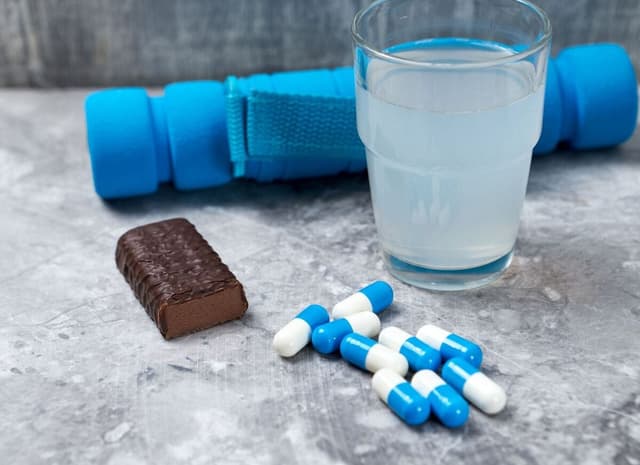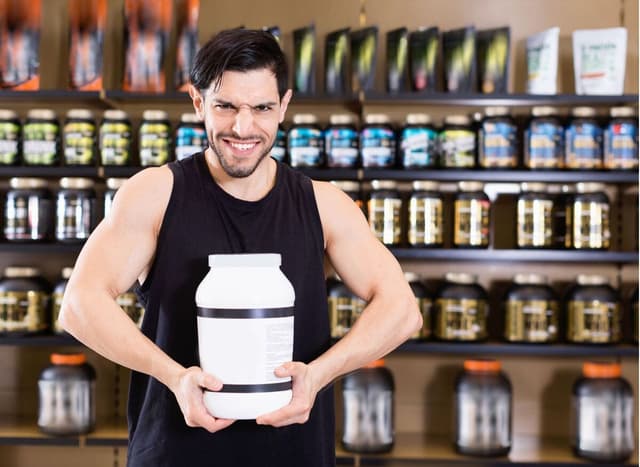Best Creatine for Men’s Muscle Growth: The Ultimate Guide

January 1, 2025
Looking to gain an edge in the gym and supercharge your results? Creatine has long been celebrated as one of the most effective and research-backed supplements for boosting strength, power, and muscle size. If you’ve been researching ways to take your workouts to the next level, you’ve likely come across the term “best creatine for men’s muscle growth.” In this article, we’ll explore why creatine is so popular, how it works to help build muscle, and which types of creatine might be best suited to your goals.
Whether you’re a seasoned lifter or just starting out on your fitness journey, understanding how creatine supports muscle growth is crucial to making the most of your training. We’ll dive into the latest research, address common misconceptions, and provide actionable tips so you can confidently choose the best creatine for men’s muscle growth. Read on to discover how this powerhouse supplement can help you break through plateaus and achieve impressive, long-lasting gains.
The Science Behind Creatine and Muscle Growth
What Is Creatine?
Creatine is a naturally occurring compound produced by the body from amino acids such as arginine, glycine, and methionine. It’s primarily stored in skeletal muscle, where it serves as a rapid energy source during high-intensity exercise. When you lift weights, sprint, or perform any explosive movement, your muscles rely on adenosine triphosphate (ATP) for energy. ATP breaks down to release energy, and creatine helps regenerate ATP quickly, allowing you to push through those last few challenging reps.
Why It’s Effective for Men’s Muscle Growth
When it comes to men’s fitness goals—especially muscle hypertrophy—creatine is hailed for its ability to:
- Increase Strength and Power: By replenishing ATP faster, you can exert more force, lift heavier weights, and enhance overall power.
- Enhance Muscle Protein Synthesis: Creatine can indirectly boost protein synthesis, a key factor in muscle repair and growth.
- Cell Volumization: Creatine draws water into muscle cells, promoting fuller muscles and potentially aiding in recovery.
These mechanisms create an environment in which your muscles can perform better and recover more efficiently.
Types of Creatine
While there are various forms of creatine, the most common include:
- Creatine Monohydrate: The most well-researched and cost-effective form. Studies indicate it’s a reliable option for improving strength and muscle mass.
- Micronized Creatine: Essentially creatine monohydrate processed into finer particles, which may enhance mixability and absorption.
- Creatine HCL (Hydrochloride): Known for its increased solubility and fewer digestive side effects, but typically at a higher price point.
- Buffered Creatine (Kre-Alkalyn): Marketed as a pH-buffered form that may reduce bloating or stomach discomfort.
Choosing the best creatine for men’s muscle growth often comes down to personal preference and individual response. However, most experts still recommend standard creatine monohydrate due to its solid evidence and affordability.
Common Myths Debunked
It’s easy to stumble upon conflicting information when researching supplements. Here are a few common myths around creatine:
- “It’s only for bodybuilders.” Not true. Recreational gym-goers, endurance athletes, and even older adults may benefit from creatine.
- “Creatine causes kidney damage.” In healthy individuals, studies have repeatedly shown no adverse effect on kidney function when taken as directed.
- “Water weight is all you’ll gain.” While creatine can increase cell hydration, long-term benefits include actual muscle gain and strength improvements.
Choosing the Best Creatine for Men’s Muscle Growth
Factors to Consider
To find the best creatine for men’s muscle growth, it’s important to weigh a few key factors:
- Price and Value: Creatine monohydrate remains the budget-friendly favorite, offering a proven record of effectiveness without straining your wallet.
- Solubility: Certain forms, like creatine HCL, mix more easily in water and may reduce stomach discomfort. If digestion issues are a concern, you might consider a more soluble form.
- Reputable Brands: Always opt for third-party tested products from well-known manufacturers. This ensures you’re getting what’s on the label, free from contaminants.
- Certification: Some supplements undergo certifications such as NSF Certified for Sport or Informed-Sport to guarantee purity and quality.
Loading and Maintenance Phases
One common question is whether you need a “loading phase” when you start taking creatine. A typical loading protocol involves taking around 20 grams of creatine per day (split into multiple doses) for five to seven days, followed by a maintenance dose of 3-5 grams per day. The logic behind loading is to saturate your muscles with creatine quickly, speeding up the point at which you see benefits like increased strength.
However, you can also skip the loading phase and simply take 3-5 grams daily from the start. You’ll reach peak creatine saturation in your muscles within about four weeks this way—slightly slower, but no less effective in the long run. Whichever method you choose, consistency is key.
Our Top Recommendations

Optimum Nutrition Micronized Creatine Monohydrate Powder
Micronized for easy mixing, supports muscle growth and endurance.
See on Amazon$0.35 per 5g serving

Nutricost Creatine Monohydrate Micronized Powder
Third-party tested, non-GMO, 5g of pure creatine per serving.
See on Amazon$0.2 per 5g serving

NSF Certified, supports muscle power and recovery.
See on Amazon$0.46 per 5g serving

ProMix Creatine Monohydrate Powder
Micronized, additive-free, ideal for performance and recovery.
See on Amazon$0.36 per 5g serving

NOW Foods Sports Nutrition Unflavored
100% pure creatine, GMP certified, boosts strength and endurance.
See on Amazon$0.2 per 5g serving
Addressing Side Effects and Safety
Some people worry about bloating, cramping, or digestive upset. Most research suggests that standard doses of creatine (3-5 grams daily) are safe for healthy individuals. Staying hydrated can help minimize any potential bloating or cramping. If you experience stomach discomfort, splitting your daily dose into smaller servings or opting for a more soluble form (like creatine HCL) could help.
- Tip: If you’re new to supplementation, start with a lower daily dose (e.g., 2 grams) to gauge tolerance. Gradually increase to 5 grams per day over a week or two.
How to Stack Creatine with Other Supplements
Another way to determine the best creatine for men’s muscle growth is by looking at potential synergy with other supplements. For instance, combining creatine with protein powder, branched-chain amino acids (BCAAs), or beta-alanine may further support muscle gains and workout performance.
- Protein Powder: Provides essential amino acids for recovery and muscle building.
- BCAAs: May help reduce muscle soreness, especially during intense training phases.
- Beta-Alanine: Helps reduce fatigue during high-repetition sets or longer HIIT sessions.
Practical Tips for Maximizing Creatine Benefits
1. Timing Your Creatine Intake
Contrary to popular belief, the exact timing of creatine consumption is not the most critical factor. Rather, ensuring your total daily intake is consistent matters more. Nonetheless, some lifters prefer to take creatine post-workout with a meal, as carbohydrates and protein can help shuttle creatine into the muscles. Here’s a simple approach:
- Pre- or Post-Workout: Mix your dose with a carbohydrate-rich beverage or add it to a protein shake.
- Off Days: Take creatine at any point in the day, aiming for consistency in daily intake.
2. Stay Hydrated
Creatine’s muscle-cell volumizing effect can leave some individuals feeling slightly dehydrated if they’re not mindful of fluid intake. Make it a habit to drink enough water throughout the day:
- Carry a Refillable Bottle: Keep track of how much water you consume.
- Electrolyte Balance: Consider electrolyte-rich beverages to support muscle function, especially if you sweat a lot during workouts.
3. Combine with Resistance Training
Simply taking the best creatine for men’s muscle growth won’t magically pack on muscle; you also need an effective workout program. Incorporate compound movements—like squats, deadlifts, bench press, and pull-ups—to challenge multiple muscle groups simultaneously. Build a routine that balances volume and intensity:
- Progressive Overload: Increase weight or reps weekly to ensure continual adaptation.
- Proper Form: Maximize muscle recruitment and reduce injury risk by maintaining correct technique.
- Rest and Recovery: Muscle growth occurs when you allow time for repair, so prioritize sleep and off days.
4. Track Your Progress
Tracking your workouts, body measurements, and even how you feel can help you see whether the creatine is contributing to your goals. Consider keeping a simple fitness journal or using a workout-tracking app. Take regular photos or measurements to gauge improvements in muscle size and definition. Over time, you’ll notice patterns that can inform whether you need to adjust your supplementation or training strategy.
5. Customize Your Approach
Not everyone responds identically to supplementation. While some men may notice rapid strength gains within a week or two, others might experience more gradual progress. Pay attention to your body:
- Adhere to a Plan: Stick with one approach for at least 6-8 weeks.
- Reevaluate Dosing: If you’re not seeing results, consider a slightly higher daily dose (e.g., 5-6 grams) or splitting your daily intake.
- Change the Form: If you experience discomfort with one type of creatine, try a different form like creatine HCL or micronized creatine.
Creatine has consistently proven itself a valuable ally in the quest for greater strength and size, making it a top choice for serious lifters and beginners alike. Whether you opt for creatine monohydrate, creatine HCL, or another variant, the real key to success is consistency—both in your supplementation and your training. Keep in mind that the best creatine for men’s muscle growth will also depend on individual factors like budget, personal tolerance, and workout style.
By following the steps outlined in this guide—choosing a reputable product, committing to a solid resistance-training program, and staying adequately hydrated—you can optimize your creatine usage and make the most of your efforts in the gym.
Don’t forget to explore our other articles for even more tips and strategies. Your journey to bigger muscles, better performance, and lasting strength gains starts now—time to lift, grow, and conquer.






